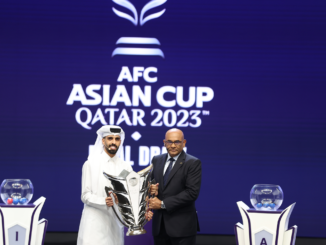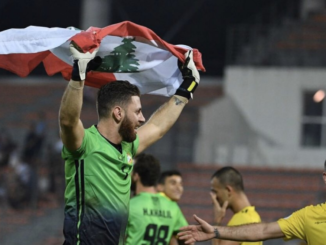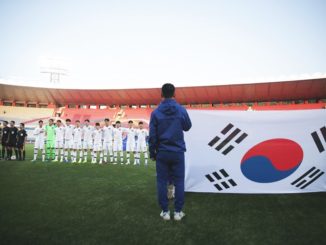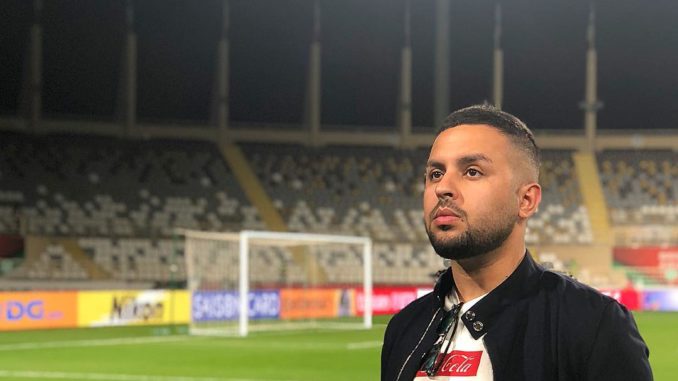
Picture this. It’s the semi final of the AFC Asian Cup and your nation is one of the final four teams left after a pulsating quarter final win over your biggest rivals.
The players walk out, wearing the flag of your country on their chest, representing you and all your people. The anthem rings out, the hairs on the back of your neck stand up. The flutters in your stomach start to get a little stronger as the nerves kick in.
It’s a moment of myriad emotions – pride, nerves, excitement, fear. But it’s a moment every fan dreams of and that moment alone is enough for most fans.
Now imagine this – you personally are responsible for one quarter of that side walking out on the pitch. Without you they likely would not be there.
Not only is this your country, this is, in effect, your side.
This is not the stuff of fantasy, however. This is the story of Iraq’s Yousif Al-Khafajy.
Born in Baghdad, Al-Khafajy and his family – he is the oldest of four children, with three younger sisters – moved to Dubai when he was just seven.
Despite his tender age, the memories of Baghdad remained vivid in his memory.
“When you say Baghdad, the first thing I remember is the river – the Tigris River,” he told The Asian Game.
“The bridges, the smell of the city. My grandad always used to take me to the centre of the city, like the old district of the city. We used to take the boats to cross the river.
“I always remember these memories, I will never forget it. It will always stick in my mind.”
When he was just ten, starting a new life in cosmopolitan Dubai, a young Al-Khafajy had to watch on as war broke out in Iraq, decimating large swathes of the country and forever altering the image of Iraq for a generation.
“Baghdad is a very beautiful city, it’s quite unfortunate what happened to it, but it’s getting back there hopefully,” he said.
“By the time I was growing up in Dubai I was getting this impression from everyone I met that the only thing they knew about Iraq was the war.
“And this kind of bothered me, it grew something in me that I wanted to change that because I was reading about Iraq from a very young age and I always knew Iraq had a great history.
“It was the cradle of civilisation and Iraq was much more than just a war zone. So since I was little I always wanted to change this idea about Iraq, and not just in football, but in general.”
Like most teenagers from the Gulf, Al-Khafajy was obsessed with football and it was through his love of the sport that he found the avenue he needed to help his country.
Learning of players abroad – in Europe and other parts of the world – with Iraqi heritage, or Iraqis that had been displaced by war, he wondered whether they could one day play for the national team.
So, enlisting the help of some other like-minded fans, he set about tracking down players all over the world and asking them directly.
“I started a Facebook page, just for fun, you know a 17-18-year-old kid starting a Facebook page, and back in the day there weren’t many Iraqis on social media because it was relatively new,” Al-Khafajy, who also has a keen interest in architecture, a subject he studied at university, said.
“So I started the page and invited a few of the bloggers to come and join me and focus on these players.”
So, together with Akam Qaser and Ali Shaheem they set about getting in touch with players from the Iraqi diaspora around the world to see if they would be interested in playing for Iraq.
“In most cases (the) players did respond because they were happy,” he explained. “Because we gave them the opportunity to play for Iraq and be international players.
“Obviously time went by, we started getting in contact with these players, we started promoting these players in Iraqi media, letting media know about them, letting the national team know about them and here we are now.”
It almost sounds too easy – contact player, player says yes, player plays for national team. But nothing in sport, especially in Iraq, is ever so easy. So what exactly is the process once a player has been contacted and confirmed they would be interested?
“Obviously any player is not part of the Iraqi football system,” the shy and softly spoken Al-Khafajy explains. “They’ll have a different citizenship, they’ll have played football in a different country. Officially they’ll have no record in Iraq.
“So when we contact the player and they show interest, what we do first is we start publishing about them, we say ‘hey, there’s a new talent we scouted, he plays in this league’, we publish this for the fans and for the media. Sometimes the TV channels they take this information, (and) they publish it. So obviously you get the right attention.
“Next stop would be to start contacting the national team and start telling them about this player. Once a coach shows interest and they want to call a player, then the struggle starts. Then we need to start working on his papers.
“It should be the FA’s duty to do all of this administration stuff, but our FA has many problems and they don’t have the ability to do all of this.”
One of the most difficult cases for Al-Khafajy was that of Justin Meram, born in Michigan to Iraqi parents. His case took well over a year to be concluded.
Writing for The Players’ Tribune in February 2018, Meram told the story of his own encounter with Al-Khafajy.
“I was checking my Facebook page when the message popped up,” he wrote.
““Are you Iraqi?” it read. Nothing else.
“This was in 2013. I honestly didn’t know what to think at first. Being someone of Middle Eastern descent who was born and raised in the United States, and living in a post-9/11 America, can be tough. And I can’t ignore that while playing in MLS I’ve had a few fans of other teams call me a “smelly terrorist” and shout racial slurs at me during games.
“As I looked at the message, I paused for a second to think. I didn’t recognise the sender’s name, Yousif Al-Khafajy, but I saw that it appeared to be Middle Eastern. For whatever reason, I started typing.
““Yes, I am,” I replied.
“To this day, I still think to myself, Why did I respond to that Facebook message?
“I had no idea what would come next. It could have been a threat, or some troll trying to antagonise me, but to my amazement it ended up being something much better than either of those things. And the reason for the message became clear pretty quickly. Yousif was a fan of the Iraqi national soccer team, and he was in the process of scouring the Internet for the names of talented Iraqi players he could pass on to the Iraq Football Federation. He began telling me about how I might be able to represent the national team at the international level.
“So I listened. And thus began this crazy journey that I’ve been on ever since, a journey with more twists and turns than a taxi ride through the streets of Basra.
“It all started with that random Facebook message.”
Now capped more than 30 times for the national team, and a player that went to both the 2015 and 2019 AFC Asian Cups, he is one of Al-Khafajy’s success stories.
There are many others too. Ahmed Yasin, Yaser Kasim, Osama Rashid, Rebin Sulaka, Frans Putros, Brwa Nouri and, most recently, Jiloan Hamad.
Like Meram, Hamad was a particularly difficult case and was a player that Al-Khafajy had his eye on for a very long time. But initially, he mostly spurned the advances and focused on his burgeoning career in Sweden, where he was called up to the national team.
But knowing Hamad was still eligible for Iraq, he didn’t give up the fight and after a long-running saga, earlier this year FIFA eventually granted in favour of Hamad, paving the way for him to make his national team debut in a 2-0 win over Hong Kong in October.
“Yousif was very instrumental,” Hamad told The Asian Game.
“I was in contact with the Iraqi national team a long time ago as well, but I think Yousif’s ability for word of mouth, he got everybody to realise I was available, he informed the Iraqi federation as well as the Iraqi fans.
“His way of communicating was very important and I think that was what got me to the national team. His ability to connect all the guys together and to help me with the case as well, it was not an easy case but he found the right people to support me.
“I don’t think I’d be in the national team without his help.”
They are sentiments shared by Brwa Nouri, who played briefly for the national team between 2016 and 2018, before prematurely retiring from the national team.
“My national team career with Iraq was sadly very brief,” he told The Asian Game from Bali where he now plays with Indonesian champions Bali United.
“But everything that I got, all the memories is because of Yousif. He was the one who contacted me and believed in me. I did not understand who he was or what his role was, but he contacted me through social media. I think initially I was not very interested, but the more that we spoke the more I wanted to represent Iraq.
“I remember talking to Ahmed Yasin about him and he told me that if there is anyone I can trust it is Yousif. It’s not just me and (Yasin), but Justin (Meram) and many more as well.
“I don’t know if he gets the credit he deserves, but a lot of us have him to thank for the chance (to play for Iraq). He is the link between us and them (federation), and it’s all without having an official role. It’s pure unselfishness, which I admire.”
But for every success, there are also those players that got away, and there are some that Al-Khafajy still regrets not being able to tie down.
“A player that I really wanted to go there (Iraq), he did go once but he never went again, he rejected call ups, was Shwan Jalal,” he admitted.
“He has good experience in England, but back in the day he was playing for Bournemouth, and we’ve always had a problem in the goalkeeper position in Iraq.
“We worked really hard so that he would come and get his chance. He basically didn’t show up to any of the call ups. So not everything works the way we want it.”
Most difficult of all for the proud Iraqi was some of the criticism he received from his own country.
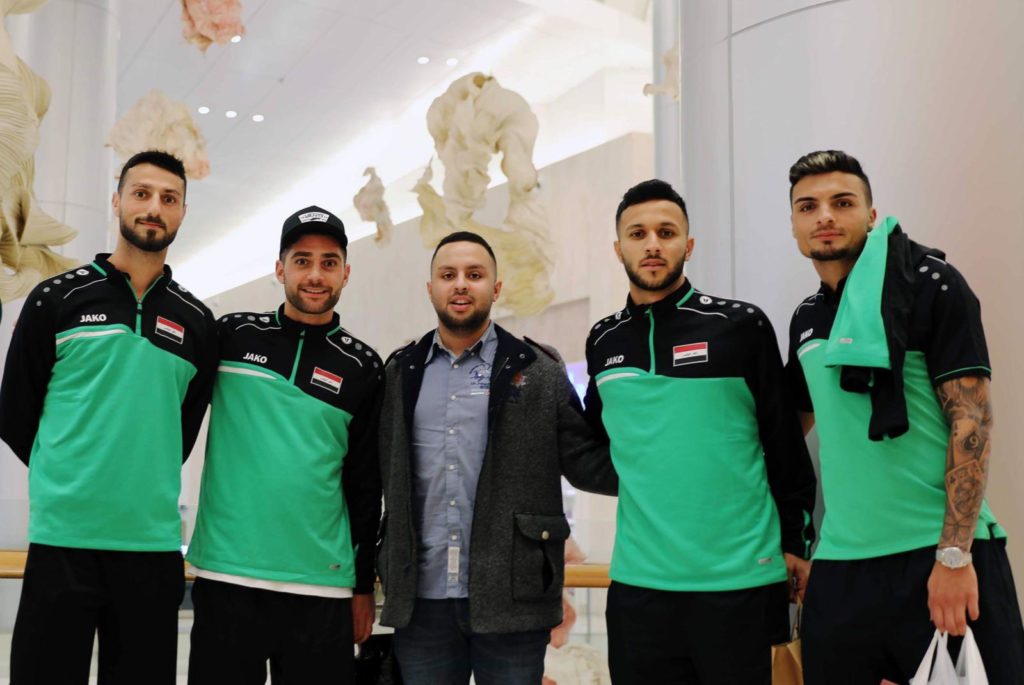
“Yeah (there has been) loads of it throughout the years,” he said with a sad tone in his voice.
“When we started it was very difficult for us because there are cultural differences. When we started in 2011 the golden generation were still playing in Iraq – Younis Mahmoud, Nashat Akram, they were the stars and they were getting all the media attention.
“Once these players came out of nowhere, players coming from Europe, they started getting attention. And maybe these players didn’t like it, they didn’t cope with it.”
There was one occasion in particular with a legend of Iraqi football that still upsets Al-Khafajy.
“Once I had an argument with Younis Mahmoud, and at a young age having an argument with a legend like Younis was quite interesting. It was quite challenging to be honest,” he said.
“He spoke bad about me on the TV (saying) that this kid wants to control the national team, but it was not true. I was quite sad, I was only trying to help my national team. I was only trying to help these players take their chances, and I was right in the end because you see many of them have become stars of the team.
“So they have proven themselves and they’ve proved that our project is right and that we can have talents from abroad make a difference.”
Al-Khafajy is the first to admit that he has made mistakes along the way, but as he grows older and wiser, he is still only 26 years old, he has learned to be smarter with the choices he makes.
“We did make mistakes, but the key thing was working to correct these mistakes,” he said.
“The biggest mistake was thinking any player from outside would make a difference, but this was not true. And believe it or not some people were against this approach, they would still think any player from outside was good enough and should be called up.
“But I was against this because it started to hurt us, because once these players come to the team and they’re not good enough then people start losing trust in us. And I had to keep this trust with the fans, with the officials.”
The issue of foreign-born players in the national team has been a thorny issue of late, with claims of splits and cliques in the national team and with most banished from the national team for the most recent FIFA World Cup qualifiers in November.
But so far, things are looking good for Iraq as they sit top of Group C, two points clear of Bahrain and five clear of rivals Iran.
Ten years on and things have changed dramatically for Al-Khafajy since he started that Facebook page. That page (Iraqi Pro Players) has since become one of the largest media outlets in Iraq, with almost 2 million followers on Facebook and a further 520,000 on twitter and Instagram.
Al-Khafajy never dreamed it would grow so big, but despite all its success over the last decade, there is one final crowning glory that he desperately wants.
“As like any Iraqi, our dream is to go to the World Cup,” he said, with a tinge of optimism in his voice.
“I am very proud and we have achieved a lot of successes. But, if we’re not going to make it to the World Cup then I’m always going to think I’ve failed in my ultimate goal.
“It’s the goal of every Iraqi to see Iraq play at the World Cup. In my lifetime I’ve seen Iraq winning the Asian Cup. I’ve seen Iraq winning other smaller tournaments, but seeing Iraq at the World Cup I have never seen that and most of Iraq has never seen that.”
Photos: Supplied
Listen to Jiloan Hamad on Episode 43 of The Asian Game podcast talk about his switch from Sweden to Iraq.


